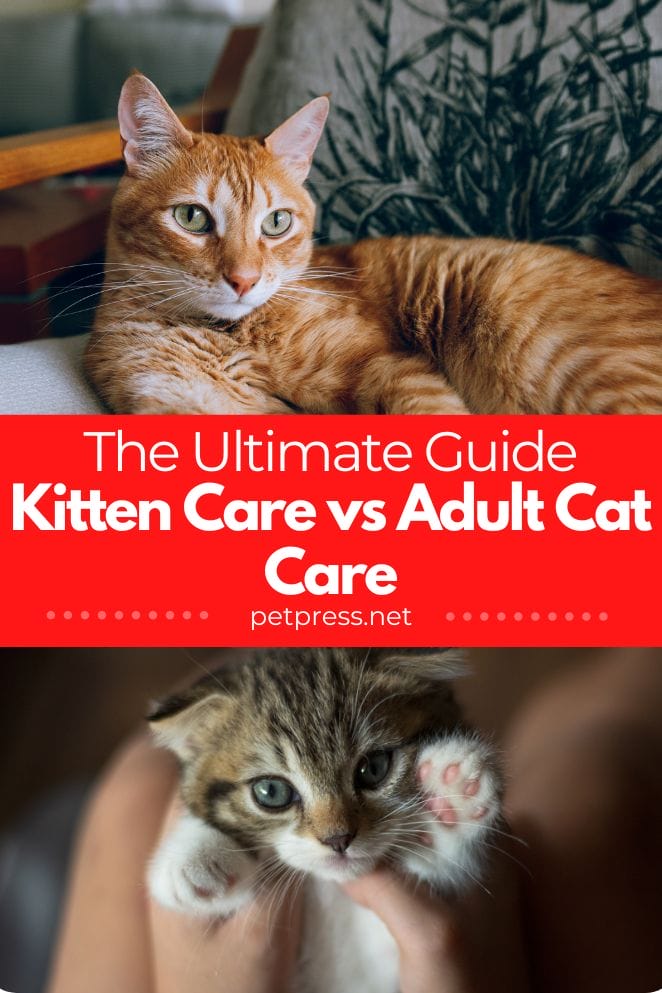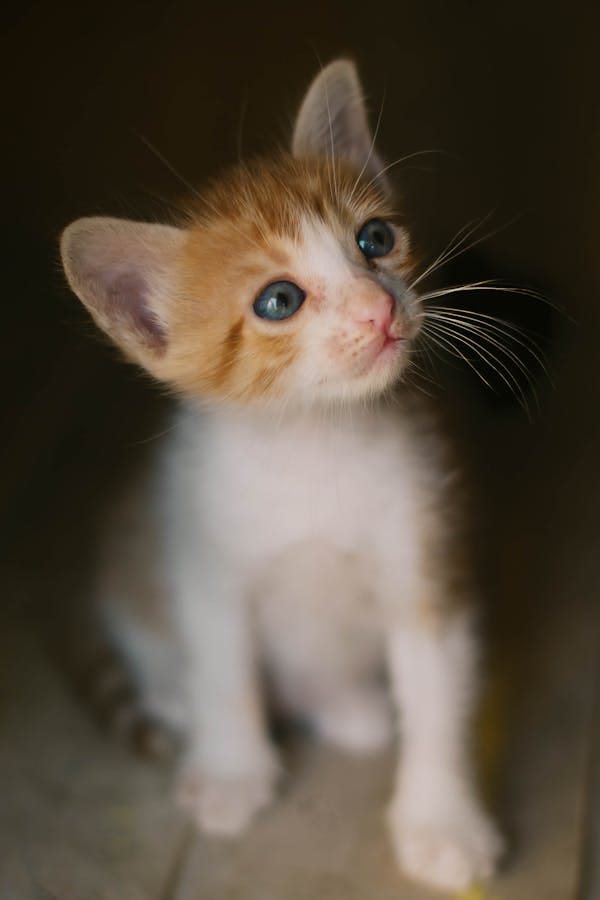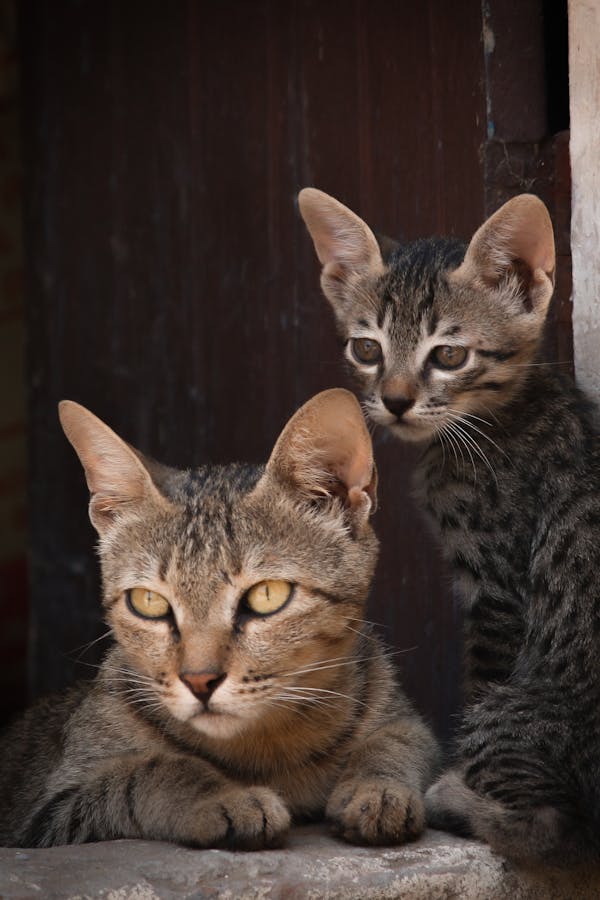
When it comes to choosing a feline friend, the decision between a kitten and an adult cat can be a difficult one.
Both life stages have their own unique needs and personalities, making it essential to understand the pros and cons of each stage before making a choice.
In this blog post, we will explore the care needs of kittens and adult cats, and help you determine which one is the best match for your lifestyle.
Kitten Care Needs
Attention & supervision
Pros
- Constant supervision prevents accidents and bad habits: Kittens are curious little creatures, exploring their surroundings with boundless energy.
- Frequent playtime burns off boundless energy: Playtime is essential for kittens to release their pent-up energy and to stimulate their physical and mental development.
- Litter box training requires patience and consistency: Teaching kittens to use the litter box is a crucial aspect of their upbringing.
Cons
- Kittens require more attention and supervision than adult cats: Unlike adult cats, kittens are still learning about the world and may get into mischief if left unsupervised.
- They may have accidents in the litter box, which can be frustrating: Despite efforts to train them, kittens may occasionally have accidents outside the litter box.
Food & nutrition
Pros
- Kittens need multiple small meals a day for proper growth: Due to their rapid growth and high energy levels, kittens require frequent feeding throughout the day.
- Specific kitten formula provides essential nutrients: Commercial kitten food is specially formulated to meet the unique nutritional needs of growing kittens.
Cons
- Kittens require more frequent feeding than adult cats: Unlike adult cats, which can thrive on one or two meals a day, kittens need to eat more frequently to support their growth and metabolism.
- Their dietary needs change as they grow, which can be costly: As kittens grow, their nutritional requirements evolve.
Health & development:
Pros
- Frequent vet visits for vaccinations and checkups: Regular veterinary care is essential for monitoring the health and development of kittens.
- Potential for internal parasites requiring treatment: Kittens are susceptible to internal parasites like roundworms and hookworms, which can affect their health and growth.
- Kitten-proofing your home protects them from dangers: Creating a safe environment for kittens is crucial in preventing accidents and injuries.
Cons
- Kittens are more susceptible to illnesses and injuries: Due to their immature immune systems and adventurous nature, kittens are more prone to illnesses and injuries than adult cats.
- Vaccinations and treatments can be costly: Providing necessary healthcare for kittens, including vaccinations, deworming, and treatment for illnesses or injuries, can be expensive.

Adult Cat Care Needs
Personality & trainability
Pros
- Established personality, easier to predict behavior: Adult cats have fully developed personalities, making it easier for owners to understand their preferences and behaviors.
- May already be litter box trained and have some manners: Many adult cats come already litter box trained and may have basic manners such as scratching posts instead of furniture.
- Less destructive chewing and scratching: Unlike kittens, adult cats have usually outgrown the phase of exploring the world with their mouths.
Cons
- Adult cats may be less playful and interactive than kittens: While kittens are known for their boundless energy and playful antics, adult cats tend to be more mellow and less interested in active play.
- They may have already developed bad habits that can be difficult to change: Adult cats may have developed undesirable habits such as inappropriate elimination or aggression due to past experiences or lack of training.
Food & nutrition
Pros
- Adult cat formula has different nutritional needs: Commercial cat food formulated for adult cats provides the specific nutrients they need to maintain their health and well-being.
- Feeding schedule depends on activity level and age: Unlike kittens, whose feeding schedules are more regimented due to their higher energy needs, adult cats’ feeding schedules can be tailored to their individual activity levels and age.
Cons
- Adult cats require less frequent feeding than kittens: Adult cats generally require fewer meals per day compared to kittens.
- Their dietary needs may change with age, which can be costly: As cats age, their nutritional requirements may change, necessitating adjustments to their diet or the use of specialized senior cat food.
Health & maintenance
Pros
- Less frequent vet visits compared to kittens: Adult cats typically require fewer veterinary visits compared to kittens.
- Potential for senior health issues with age: While adult cats may be generally healthy, they are susceptible to age-related health issues such as arthritis, dental problems, and kidney disease.
- Less demanding of your time and attention: Adult cats are generally more independent and less demanding of constant attention compared to kittens.
Cons
- Adult cats may have existing health issues that require attention: Some adult cats may have pre-existing health conditions or chronic issues that require ongoing management and veterinary care.
- They may require more space and resources for exercise and stimulation: While adult cats may be less active than kittens, they still require regular exercise and mental stimulation to maintain their health and prevent boredom.

Matching Your Lifestyle to a Cat:
Active family
If you have a bustling household with energetic kids, a playful kitten might be an excellent addition.
Kittens thrive in environments where they can romp and play, providing endless entertainment for children with their playful antics.
They also tend to form strong bonds with family members, offering companionship and affection.
However, it’s essential to supervise interactions between young children and kittens to ensure gentle handling and prevent accidental injuries to both parties.
Busy professional
For individuals with demanding work schedules and limited time for pet care, a calmer adult cat may be the perfect match.
Adult cats are generally more independent and self-sufficient than kittens, requiring less attention and supervision.
They are content to entertain themselves during the day while their owners are away and are often happy
y to relax in the evening with some gentle petting or lounging on the couch.
This makes them an ideal companion for busy professionals who appreciate the companionship of a pet without the constant demands of a kitten.
Young children
When considering a cat for a household with young children, opting for an adult cat accustomed to gentle handling may be the best choice.
Unlike kittens, adult cats have already developed their personalities and behaviors, making it easier to find one that is tolerant and patient with children.
Look for a cat with a calm demeanor and a history of positive interactions with kids.
An adult cat is less likely to be overwhelmed by the energy and exuberance of young children, reducing the risk of stress or aggression.
Existing pets
Introducing a new cat into a home with existing pets can be challenging, but adult cats tend to adapt more easily to the presence of other animals.
Unlike kittens, who may be overly curious or assertive with other pets, adult cats are more likely to approach introductions calmly and may even establish amicable relationships with resident animals over time.
However, it’s essential to follow proper introduction protocols to minimize stress and prevent conflicts between pets.
With patience and gradual introductions, adult cats can integrate successfully into multi-pet households and become valued members of the family.

Conclusion
In conclusion, both kittens and adult cats have their own unique care needs and personalities.
Kittens require more attention, supervision, and feeding, but they can provide endless entertainment and companionship.
Adult cats, on the other hand, are less demanding of your time and resources, but they may require more space and stimulation.
When choosing between a kitten and an adult cat, consider your lifestyle, preferences, and the resources you are willing to dedicate to your feline friend.


GIPHY App Key not set. Please check settings